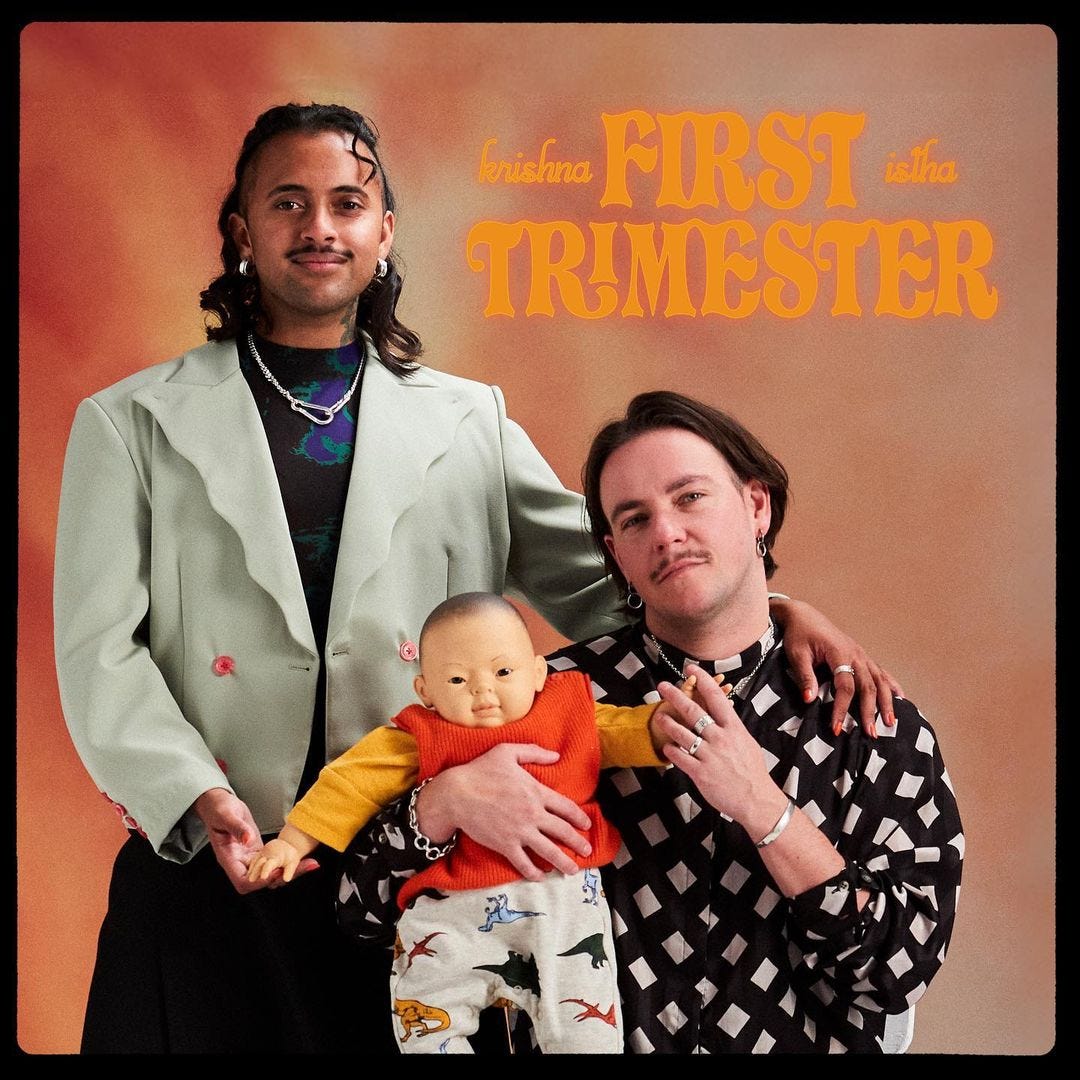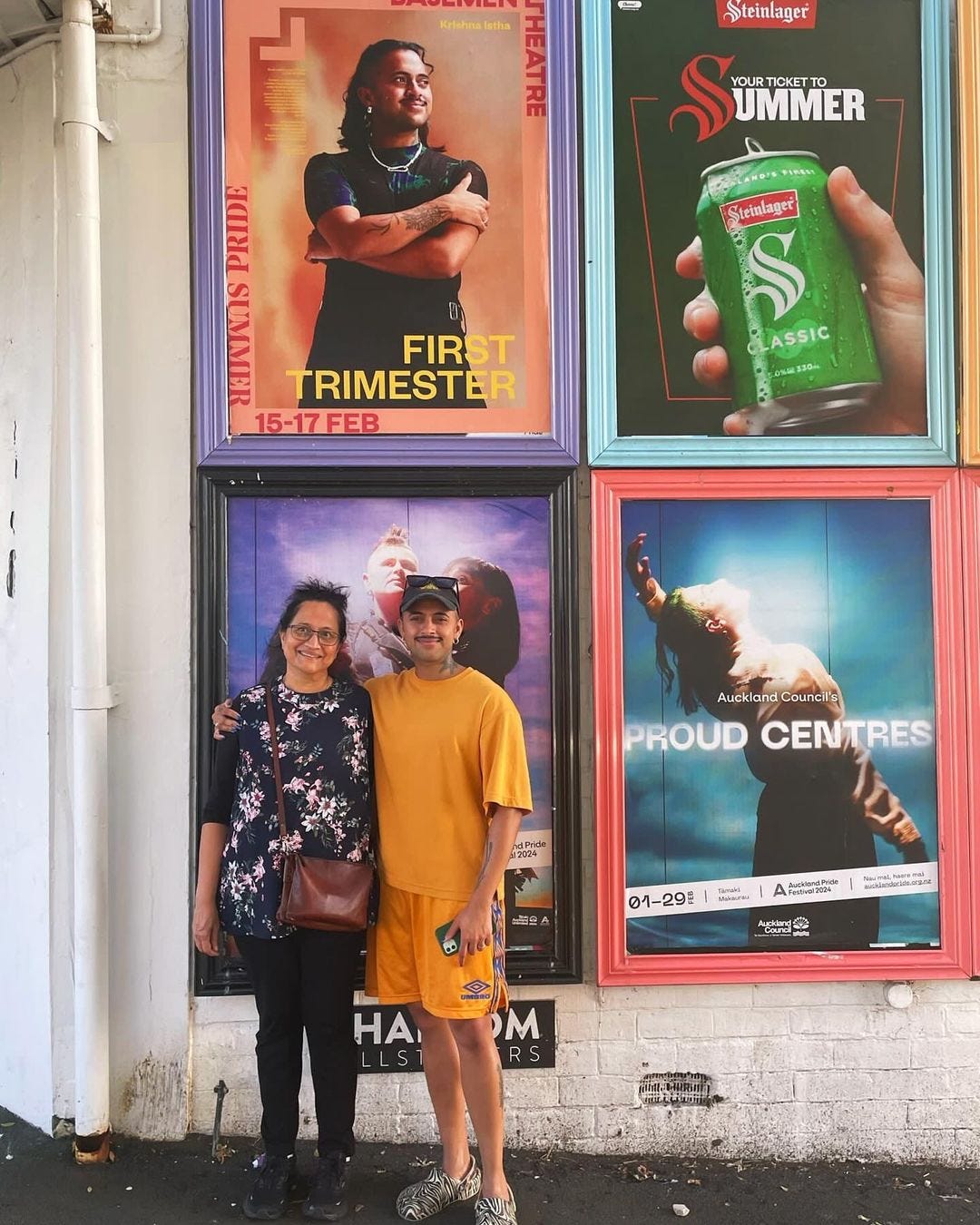Broadcasting: Krishna Istha
TV writer, performance artist and comedian Krishna Istha talks about their journey into parenthood from a trans perspective, and their relationship with comedy as a tool to tackle taboo subjects.
Krishna Istha was first introduced to me at the Ham Yard Hotel in London, back in 2022. If you haven’t frequented this prestigious central London spot, then you won’t have had the pleasure of using some of the best-smelling hand soap to ever exist, or trying the cookies that are so good they should be illegal. I knew I liked Krishna when - before they’d even sat down - they humoured me by agreeing to discuss said cookies with me in a frankly bizarre amount of detail. Why doesn’t everywhere bring you a little snack with your hot drink? (you don’t get them if you order an iced coffee - I’ve tried). What have they put in them that makes them so good? What did I do so wrong that one time they gave everyone else on my table TWO cookies and me none?
Krishna’s willingness to discuss baked goods with me isn’t the only reason I admire them, of course (although I think that’s reason enough to like someone, personally). Interested in exploring taboo and underrepresented experiences of gender, race and sexual politics, Krishna has written on Sex Education (S4), featured on Hannah Gadsby’s Gender Agenda, and been nominated for an Offie Award for their most recent theatre show, First Trimester. First Trimester is the first in a trilogy of performance pieces documenting Krishna’s journey into parenthood as a trans person, as they interview hundreds of prospective sperm donors live on stage. Krishna and their partner Logan Rea were also recipients of the Netflix Documentary Talent Fund, making Sperm Donors Wanted!, a short film about the process.
We talk about how Krishna’s upbringing has shaped their sense of family, the role comedy plays in exploring marginalised perspectives, and the importance of truthful media portrayals of these experiences.
“I’m interested in putting characters who have underrepresented perspectives and experiences into stories and situations that are universal.”

On Hannah Gadsby’s Gender Agenda, you introduce yourself as an ‘Indian American, kind-of-Australian person living in Britain, who is a transmasculine, non-binary, bisexual, polyamorous, dyslexic performance artist’. Give me a breakdown of what that looks and feels like for you!
You could do my set for me! Obviously that introduction is a bit of a joke, but I say those things because they feel true to me in one way or another. I was born in America, and then my parents got divorced and I moved to India with my mum when I was two. I spent most of my childhood there, in Bangalore. We then moved to Tooting, in South West London, and I’ve been in London ever since. My sister lives in Australia, so I lived there for a while, and my partner is from New Zealand. I think part of the reason I introduce my set like that is because I spent so long without a sense of identity. I don’t think I associated myself with any one thing until I moved to the UK. Culturally, I wonder if it’s because everyone around me looked like me when I was in India? Whereas, when I came to London, I started to think of myself as Indian because the context changed and suddenly it felt like it mattered.
In your documentary, you speak about growing up with your mum, your older sister and your uncle who, despite not being biologically related to you, you think of as a parent. Now that you’re on your own parenting journey, do you think your upbringing has shifted your sense of what family means to you?
I think so. My father was never around, but my uncle always was, so I relate to people as family because of how I exist with them and how we love each other, as opposed to being forced to be in a family together. Growing up, I was surrounded by friends with single mums or friends who were being raised by their grandparents, so it’s not like my situation felt unique. Sometimes my partner will be like, “it’s strange that you have no issues about growing up without a dad”, but I have honestly never thought about it. If people are raising you then they are your family. I think it’s as simple as that.
Have you always wanted to be a parent?
Yes! When I was younger, anyone that came to our house would hand me their baby. My favourite thing to do was to put a baby to sleep, which sounds really weird now that I’m saying it! But I’ve always loved looking after kids. I used to run a queer babysitting service and now I babysit my friends’ kids. Although, I do quite like being able to hand the baby back, so that’ll be something to get used to…! My partner hasn’t always wanted children but he does now. He doesn’t want to carry a child, so hopefully I will be.
How does it feel having your journey into parenthood explored live on stage in your show First Trimester?
It’s exciting. I’ve spoken to over 200 potential sperm donors so far! The weirdest thing is not knowing who is going to sit opposite me. Then there’s the added element which is the fact that it isn’t just my journey; it’s my partner’s too. At the end of every tour, the final interview is with him. He comes on stage and we ask each other questions about how we’re feeling. It can be hard sometimes. Making anything with a partner is intense, especially when you’re both fiery Aries! But we have learned how to work together now. The first time we did the show, we were also making the documentary at the same time, which he directed. That made it easier because we found different things to be in charge of. I was like, “if I help you get funding to make this documentary, will you let me make a show about our lives?!”
What’s been the most surprising thing about the whole experience?
I think the thing that continues to surprise me is the openness of everyone who shows up. Even if they don’t know that much about the trans experience or have the right words or vocabulary, they are open enough to be there and engage. I think we are fed this idea through the media that most people are anti-trans. Of course, there are those people out there, but I also think there is a lot of fear mongering around trans issues. Some of the headlines we see in the media are the same words that were used to speak about gay people in the 80s and 90s. I can’t help but notice that there tend to be spikes of attacks against marginalised people at the same time that right-wing governments are trying to do something dodgy and hoping that it goes unnoticed!
Often the voices that are the loudest come from people who don’t have the lived experience. I work with an amazing charity called Heard, who are trying to change that. They run a programme called All About Trans, which works to improve media representation of trans people, through facilitating conversations between members of the community and media professionals.
Correcting the bias and shifting people’s perspectives is so integral to what I’m trying to do with this newsletter. I’m interested to know how you find the landscape as a writer - what are your interactions with producers in the industry?
I’ve only been in the TV industry for the last three or so years, but it does feel like it’s dominated by white people who want to do better but are unable to follow through. I’m not sure they trust us to tell the stories they want us to tell, and I think that fear comes from a bias that they don’t even realise they have. I’m curious to know how shows exploring marginalised perspectives get pitched to commissioners and streamers; I’m not confident that there’s always someone in the room who can speak directly to those experiences! Maybe that’s why we see the same kind of shows coming through, because they are reflective of the experiences of those making the decisions.
You were in the writers’ room for the fourth series of Sex Education. Do you think truthful representations of marginalised perspectives are even more important for younger audiences?
I think younger audiences are way more clued up on everything. So, whilst we need authentic and realistic representation across the board, younger viewers just won’t watch something if it doesn’t feel truthful. I have friends with kids who are 18 or 19, and they’re watching shows like Euphoria, where there’s so much diversity amongst the characters. I am not pro-Euphoria for multiple reasons, but the first series was the first time I’d seen a trans character allowed to just be herself. I loved that storyline. I’d love to tell fun, nuanced stories about queer people, trans people and people of colour, where the actual narrative is about so much more than that. I’m interested in putting characters who have underrepresented perspectives and experiences into stories and situations that are universal.
Sex Education is largely a comedy, and - having read your writing and watched your shows - I know that you tend to be drawn to storytelling that is laced with humour. Why do you think that is?
Mostly instinct. I tend to see the funny in every situation. I think most people react to situations in funny ways, regardless of what they are. I love shows like Succession or Killing Eve because they are both inherently dramatic and so funny. There are so many different ways to be funny, so I think comedy is a great tool to convey diverse experiences to a mainstream audience that might not necessarily understand otherwise. It’s a way into people’s hearts and minds that otherwise might be more difficult.
I wonder if our sense of humour comes from our upbringing. I remember my mum used to play tricks on me and my brother. She’d call them ‘scenarios’ and they were essentially comedy skits that we would have to react to. To this day, our favourite thing to do is to imagine the most bizzare situations and how we would react in them! What do you find funny, and can you trace it back to childhood?
That is so interesting. See, every time I have fallen over, even as a child, my mum would burst out laughing. She would be laughing so hard as she helped me up, and now I don’t find slapstick humour funny at all. So maybe I have trauma from that! Thanks mum! There’s definitely a silliness that I get from her though. As well as the shows I grew up watching. In India, we’d get all of the old American sitcoms, like Sister Sister, Who’s the Boss and The Nanny.
Am I right in thinking that your mum is going to be involved in the next iteration of your show?
Yes! We are applying for funding to make Second Trimester in India, which is the second show in our parenting journey trilogy. It will be created and performed with my mum, when I am hopefully pregnant! She isn’t a performer, but we want to explore her relationship to some stories from her life that are connected to my childhood, her motherhood and my impending parenthood. She is really keen to work with other parents of trans people in India, which would be amazing. It feels very special. I almost feel like I am her parent now! I think that happens when you transition from child to adult. It’s been so cute to see her. She’s like, “maybe I am a performance artist now!”





